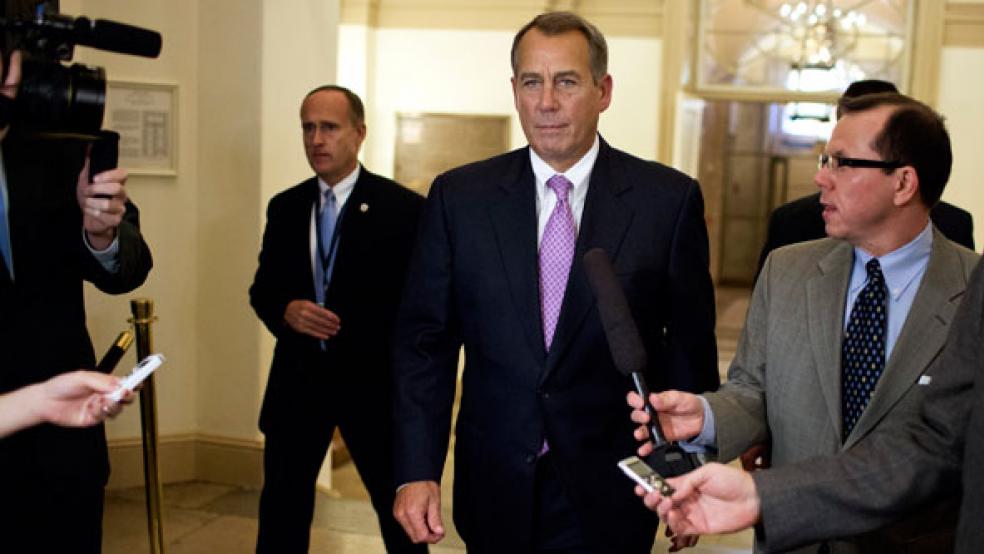House Speaker John Boehner proved that he sincerely intends to avoid a government default, floating a plan Thursday to extend the debt ceiling for six weeks.
It’s a positive sign that the economic damage from Washington gridlock can be contained. But then at a White House meeting with 18 Republican congressmen, President Obama rejected the offer, since it would require him to begin budget talks while the government remains partially closed.
RELATED: THREE WAYS TO END THE GOVERNMENT SHUTDOWN
The president has thus far refused to negotiate until the shutdown ends, a stance that Boehner (R-OH) tried to challenge by dangling the possibility of avoiding default.
“It's time for these negotiations and this conversation to begin,” Boehner said. “And I would hope that the president would look at this as an opportunity and a good-faith effort on our part to move halfway – halfway to what he’s demanded in order to have these conversations begin.”
GOP congressmen reportedly saw the meeting as a positive first-step and said they would continue to work through issues with the White House.
The stock market heaved a sigh of relief after Boehner spoke in the morning, with the S&P 500 index closing up 2.18 percent, after having declined during the week due to the turmoil and uncertainty coming from Capitol Hill.
But even if they agree to talk, there is no evidence that Obama and GOP congressmen can resolve their profound differences over another 45 days. After all, it took more than two years of backbiting, failed peace offerings, and spurned deals for the rivals to finally shutdown the government this month.
Democrats said Thursday that they were hesitant to endorse the GOP measure until they see it in writing. Many Democratic lawmakers are still leery about agreeing to budget talks as long as the government is shuttered.
White House press secretary Jay Carney suggested after much hemming and hawing in his daily press briefing that Obama would “likely” sign a “clean” debt ceiling bill, even though the administration would prefer a longer-term increase in the $16.7 trillion debt ceiling.
RELATED: LEW SAYS DEFICIT MAY SOAR IF DEBT LIMIT IS BREACHED
“The president is happy that cooler heads, at least, seem to be prevailing in the House, that there at least seems to be a recognition that default is not an option,” he said.
“Let’s see what it is and take it one step at a time,” said House Minority Leader Nancy Pelosi (D-CA). “I hope it’s something we can support.”
A BLAST FROM THE PAST BUDGET WARS
But all of these carefully worded statements are about whether to open budget negotiations, rather than the much harder obstacle of reaching an actual deal that prevents the nation from veering into a fiscal crisis every few months.
After all, Obama and Boehner have struggled to settle their ideological disagreements about the budget and deficit since 2011, when the government nearly defaulted before a last-minute deal that ultimately led to roughly $1 trillion in sequestration cuts through 2023.
The 2011 deal strained the tenuous relationship between Obama and Boehner, reportedly leaving both of them deeply distrustful of the other. Those tensions only became worse this year, after House Republicans called for a return to “regular order” but refused to negotiate when the Democratic majority Senate passed a budget.
Republicans have resisted making additional tax increases part of any negotiations, a stipulation that Democrats who still see an opportunity to close tax loopholes have previously rejected.
Boehner has discussed making cuts to spending growth in Medicare and Social Security the focus of budget talks, a priority that is being echoed in potential bargains being put together by House Budget Committee Chairman Paul Ryan (R-WI) and Sen. Rob Portman (R-OH).
Obama said in a Tuesday press conference that he “will not eliminate any topic of conversation” during hypothetical budget talks. But the president also downplayed any chances of success.
“What'll happen is we won't agree on everything,” he said. “I mean, the truth is, is that the parties are pretty divided on a whole big—bunch of big issues right now.”
More importantly, the claim that voters want a compromise isn’t entirely accurate. The Pew Research Center explored the dynamic in which voters press for an agreement in some polls, but support for a deal vanishes when the survey includes specifics about what would have to be given up.
The shutdown began on Oct. 1 because House Republicans demanded that funding the government should depend on defunding Obamacare, which later became a call for delaying the program for one year.
When Pew asked in a recent poll whether Republican voters would support a spending “bill without health care changes,” 54 percent said that would be “unacceptable” to them. Just 34 percent of GOP voters approved.
The exact opposite applied to Democrats, 58 percent of who said it would be unacceptable to tinker or stop Obamacare in return for a measure that would reopen the government.
“In the battle over funding the government, the health care law–which Republicans have put at the center of the debate–brings out passionate views on both sides,” Pew said in a memo about the phenomenon. “This intensity likely goes a long way in explaining why Americans want their leaders not to throw in the towel on the shutdown, though they still favor the idea of compromise in general.”





